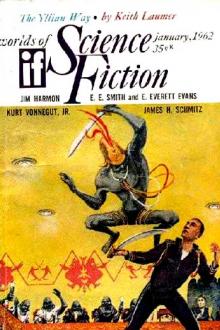Bat Wing by Sax Rohmer (bts books to read .TXT) 📗

- Author: Sax Rohmer
Book online «Bat Wing by Sax Rohmer (bts books to read .TXT) 📗». Author Sax Rohmer
“What!” shouted Wessex, in sudden excitement. “What!”
“I said a frame-up,” repeated Harley, quietly. “An American term, but one which will be familiar to you.”
“Good God!” muttered the detective, “you have turned all my ideas upside down.”
“What may be termed the physical evidence,” continued Harley, “is complete, I admit: too complete. There lies the weak spot. But what I will call the psychological evidence points in a totally different direction. A man clever enough to have planned this crime, and Camber undoubtedly is such a man, could not—it is humanly impossible—have been fool enough, deliberately to lay such a train of damning facts. It’s a frame-up, Wessex! I had begun to suspect this even before I met Camber. Having met him, I knew that I was right. Then came an inspiration. I saw where there must be a flaw in the plan. It was geographically impossible that this could be otherwise.”
“Geographically impossible?” I said, in a hushed voice, for Harley had truly astounded me.
“Geographical is the term, Knox. I admit that the discovery of the rifle beneath the floor of the hut appalled me.”
“I could see that it did.”
“It was the crowning piece of evidence, Knox, evidence of such fiendish cleverness on the part of those who had plotted Menendez’s death that I began to wonder whether after all it would be possible to defeat them. I realized that Camber’s life hung upon a hair. For the production of that rifle before a jury of twelve moderately stupid men and true could not fail to carry enormous weight. Whereas the delicate point upon which my counter case rested might be more difficult to demonstrate in court. To-night, however, we shall put it to the test, and there are means, no doubt, which will occur to me later, of making its significance evident to one not acquainted with the locality. The press photographs, which I understand have been taken, may possibly help us in this.”
Bewildered by my friend’s revolutionary ideas, which explained the hitherto mysterious nature of his enquiries, I scarcely knew what to say; but:
“If it’s a frame-up, Mr. Harley,” said Wessex, “and the more I think about it the more it has that look to me, practically speaking, we have not yet started on the search for the murderer.”
“We have not,” replied Harley, grimly. “But I have a dawning idea of a method by which we shall be enabled to narrow down this enquiry.”
It must be unnecessary for me to speak of the state of suppressed excitement in which we passed the remainder of that afternoon and evening. Dr. Rolleston called again to see Madame de Stämer, and reported that she was quite calm. In fact, he almost echoed Val Beverley’s words spoken earlier in the day.
“She is unnaturally calm, Mr. Knox,” he said in confidence. “I understand that the dead man was a cousin, but I almost suspect that she was madly in love with him.”
I nodded shortly, admiring his acute intelligence.
“I think you are right, doctor,” I replied, “and if it is so, her amazing fortitude is all the more admirable.”
“Admirable?” he echoed. “As I said before, she has the courage of ten men.”
A formal dinner was out of the question, of course; indeed, no one attempted to dress. Val Beverley excused herself, saying that she would dine in Madame’s room, and Harley, Wessex, and I, partook of wine and sandwiches in the library.
Inspector Aylesbury arrived about eight o’clock in a mood of repressed irritation. Pedro showed him in to where the three of us were seated, and:
“Good evening, gentlemen,” said he, “here I am, as arranged, but as I am up to my eyes in work on the case, I will ask you, Mr. Harley, to carry out this experiment of yours as quickly as possible.”
“No time shall be lost,” replied my friend, quietly. “May I request you to accompany Detective-Inspector Wessex and Mr. Knox to the Guest House by the high road? Do not needlessly alarm Mrs. Camber. Indeed, I think you might confine your attention to Mrs. Powis. Merely request permission to walk down the garden to the hut, and be good enough to wait there until I join you, which will be in a few minutes after your arrival.”
Inspector Aylesbury uttered an inarticulate, grunting sound, but I, who knew Harley so well, could see that he felt himself to be upon the eve of a signal triumph. What he proposed to do, I had no idea, save that it was designed to clear Colin Camber. I prayed that it might also clear his pathetic girl-wife; and in a sort of gloomy silence I set out with Wessex and Aylesbury, down the drive, past the lodge, which seemed to be deserted to-night, and along the tree-lined high road, cool and sweet in the dusk of evening.
Aylesbury was very morose, and Wessex, who had lighted his pipe, did not seem to be in a talkative mood either. He had the utmost faith in Paul Harley, but it was evident enough that he was oppressed by the weight of evidence against Camber. I divined the fact that he was turning over in his mind the idea of the frame-up, and endeavouring to re-adjust the established facts in accordance with this new point of view.
We were admitted to the Guest House by Mrs. Powis, a cheery old soul; one of those born optimists whose special task in life seems to be that of a friend in need.
As she opened the door, she smiled, shook her head, and raised her finger to her lips.
“Be as quiet as you can, sir,” she said. “I have got her to sleep.”
She spoke of Mrs. Camber as one refers to a child, and, quite understanding her anxiety:
“There will be no occasion to disturb her, Mrs. Powis,” I replied. “We merely wish to walk down to the bottom of the garden to make a few enquiries.”
“Yes, gentlemen,” she whispered, quietly closing the door as we all entered the hall.
She led us through the rear portion of the house, and past the quarters of Ah Tsong into that neglected garden which I remembered so well.
“There you are, sir, and may Heaven help you to find the truth.”





Comments (0)